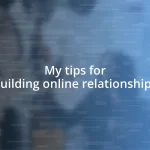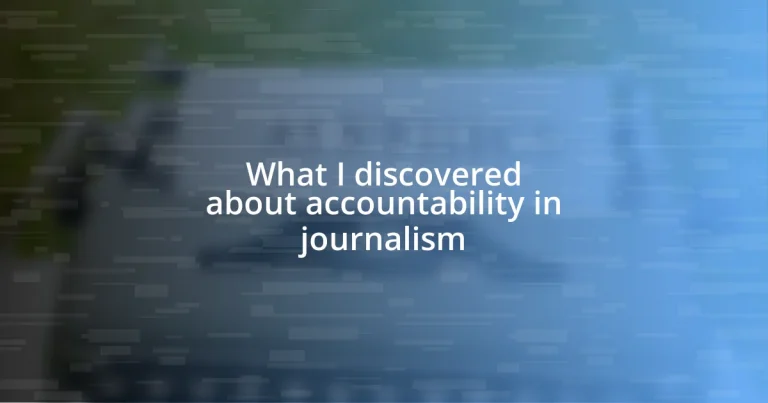Key takeaways:
- Accountability in journalism is essential for building public trust; journalists must own their work and its societal impact.
- Engaging with the audience and fostering transparency in reporting enhances credibility and encourages constructive dialogue.
- Emerging technologies and collaborations with watchdogs may shape the future of journalistic accountability, promoting accuracy and trust.
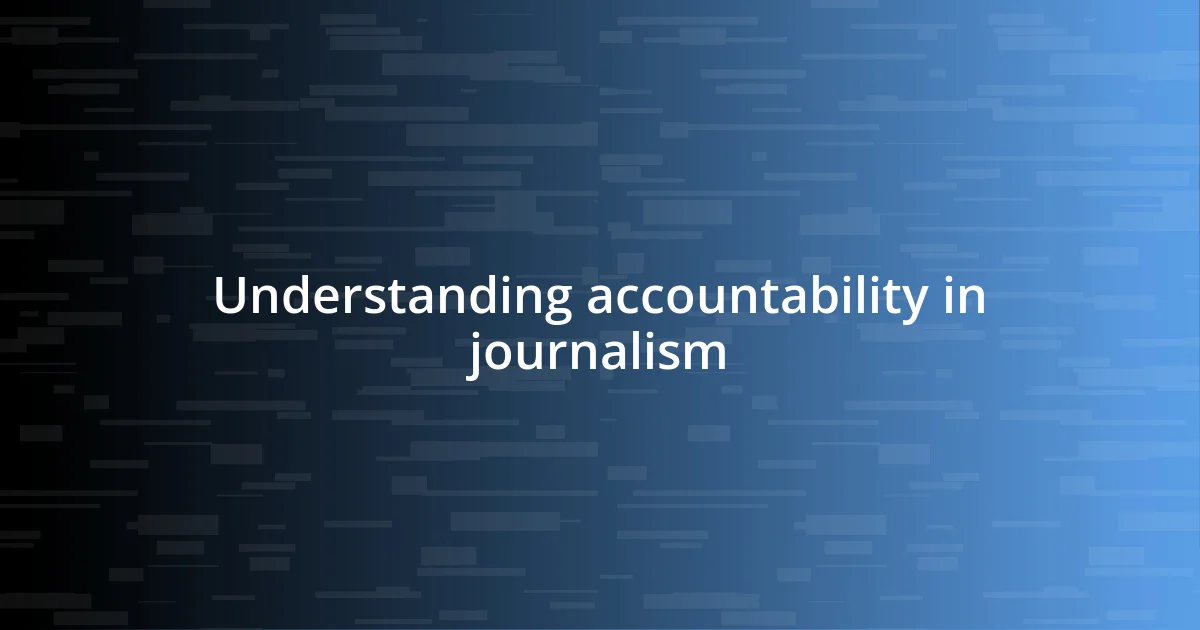
Understanding accountability in journalism
Accountability in journalism is the bedrock of public trust; it requires journalists to own their work and the impact it has on society. I recall a time when an article I wrote misrepresented a source’s intent, and the backlash was immediate and harsh. That experience taught me that accountability isn’t just a professional obligation; it’s a personal one.
Consider this: when was the last time you read a news story and thought, “I wonder if this reporter truly understands their responsibility?” I’ve felt that way many times, especially when sensationalism overshadows accuracy. In those moments, it’s evident that accountability isn’t merely about correcting mistakes but also about striving for a higher standard of truthfulness.
It’s worth pondering the emotional weight that comes with being accountable. I remember interviewing a whistleblower who faced personal danger to bring a story to light. The commitment to ethical reporting amidst such risks highlights how crucial it is for journalists to uphold accountability, not just for their own credibility, but for the sake of those they serve. Isn’t it compelling to think about the lives that hang in the balance when we engage with this responsibility?
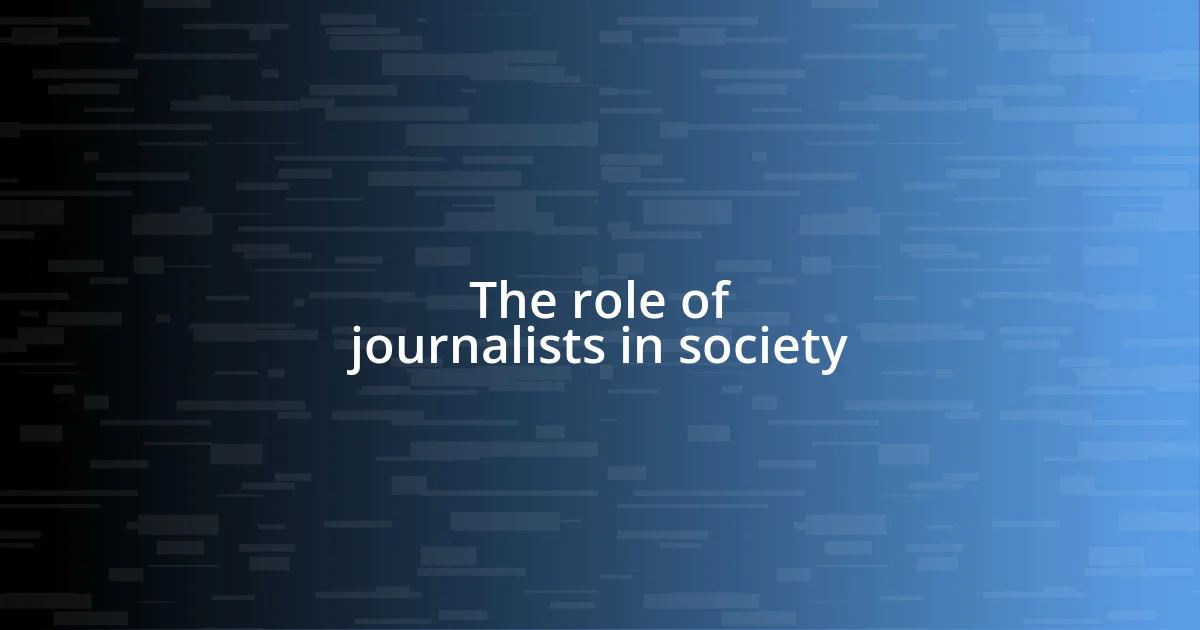
The role of journalists in society
Journalists play a pivotal role in society, often acting as the bridge between the public and critical information. I recall a particularly impactful moment when I uncovered a story that revealed corruption within a local government. The reaction from the community was profound, with many expressing gratitude that someone took the time to dig deeper and expose the truth. This instance reaffirmed my belief that journalism is essential for holding power to account.
In a rapidly changing media landscape, the responsibility of journalists extends beyond mere reporting. They must engage with their audience, fostering trust and transparency. I remember attending a town hall meeting where a journalist from my team opened the floor to questions about our reporting process. The listeners were grateful for the chance to understand what we do, and it was clear that such interactions make a big difference in building trust.
This dynamic relationship between journalists and society emphasizes the importance of ethical reporting. Missteps can erode public confidence, so I’ve always taken extra care when covering sensitive topics. Sharing the context of a story is just as critical as the content, as it ensures that the audience receives a well-rounded understanding. How often do we think about the stories not just as headlines but as narratives that affect real lives since they shape public perception?
| Role of Journalists | Impact on Society |
|---|---|
| Informing the Public | Educates citizens on important issues |
| Holding Power Accountable | Acts as a check on authority |
| Fostering Transparency | Encourages trust between media and the public |
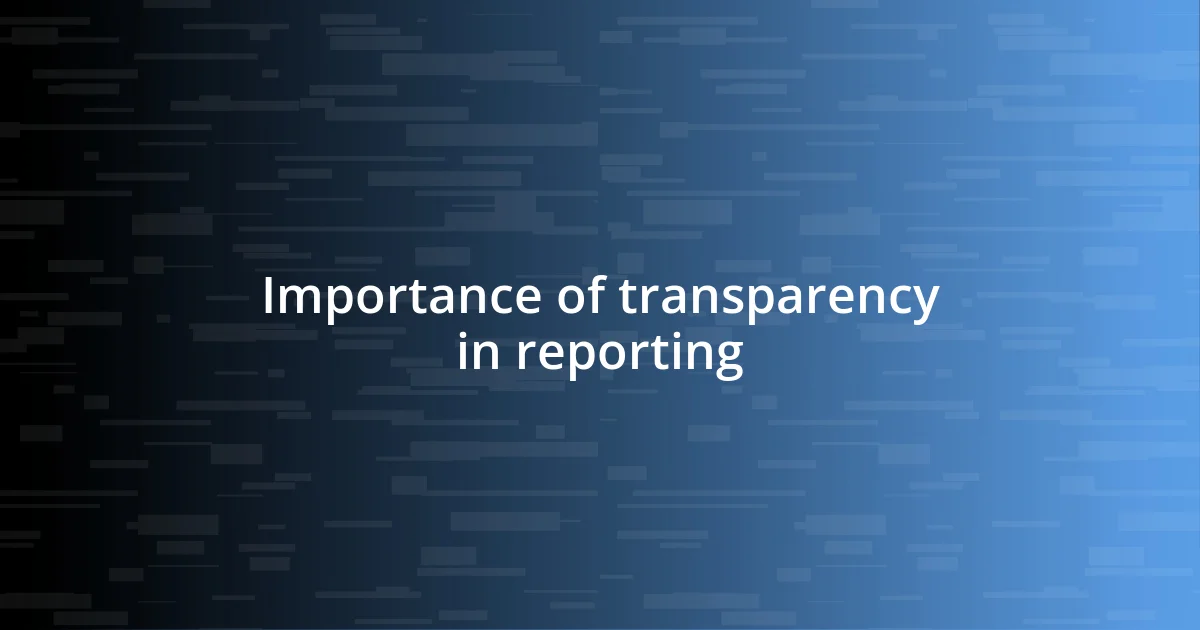
Importance of transparency in reporting
Transparency in reporting is vital for building trust between journalists and their audience. I vividly remember a time when I decided to publicly share the process behind a complex investigative piece I was working on. Some readers were skeptical at first, but the more I opened up about my sources, challenges, and ethical dilemmas, the more supportive the feedback became. This experience underscored for me that when audiences see the framework of a story, they not only understand it better but also feel more connected to those telling it.
- Transparency helps demystify the reporting process, making it accessible to the public.
- It allows journalists to clarify their intentions and decisions, boosting credibility.
- Sharing the reasoning behind editorial choices fosters dialogue with the audience, encouraging engagement.
- When reporters admit uncertainties or mistakes, it humanizes them and builds rapport.
- Transparent practices can serve as a model for ethical journalism, inspiring others in the field.
On another occasion, I attended a community forum where a local journalist shared in detail the sources and research behind a controversial report. Watching the audience’s reaction was telling; they appreciated the honesty, even if they didn’t agree with every conclusion. As I listened, I realized that transparency creates a safe space for constructive criticism and dialogue. It’s about inviting the audience into the storytelling process, making them stakeholders and partners in the pursuit of truth.
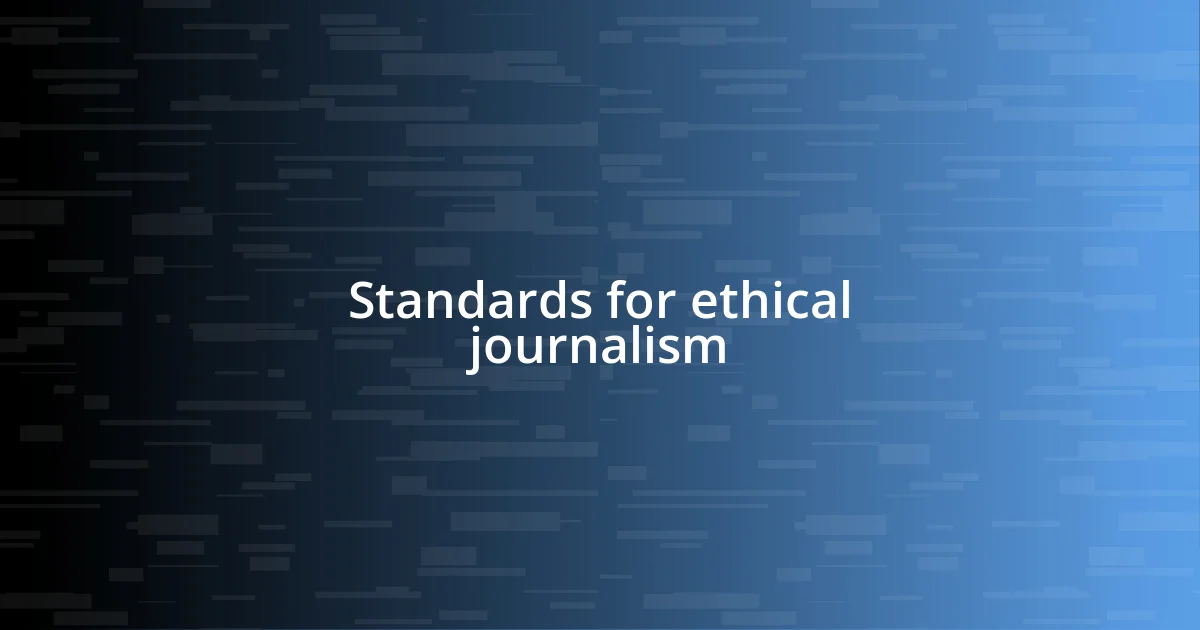
Standards for ethical journalism
Standards for ethical journalism are foundational to maintaining credibility and trust within the community. I recall a workshop on journalistic ethics that transformed how I perceive my responsibilities. A seasoned journalist emphasized that fairness and accuracy are non-negotiable principles. This advice resonates with me every time I report on complex issues—because, let’s face it, a single misstep in facts can unravel the hard-earned trust with the audience.
Another vital standard is the need for transparency about sources and methods. I once worked on a story that relied heavily on anonymous sources. It became a delicate balancing act, as I had to defend the decision to protect those voices while ensuring the audience understood the critical context. Have you ever pondered what happens when sources can’t go on record? It’s essential to communicate the reasoning behind such decisions; failure to do so leaves room for doubt and speculation.
Ethical journalism also demands a commitment to the impact of reporting. There was a time when I covered a sensitive community issue, and I was acutely aware of my words’ potential consequences. It made me question: am I genuinely contributing to the dialogue, or am I simply feeding a narrative? That moment taught me that ethical journalists must prioritize the welfare of the community even more than the pursuit of sensational stories. It’s about nurturing a relationship where the truth doesn’t just inform but also empowers the audience.
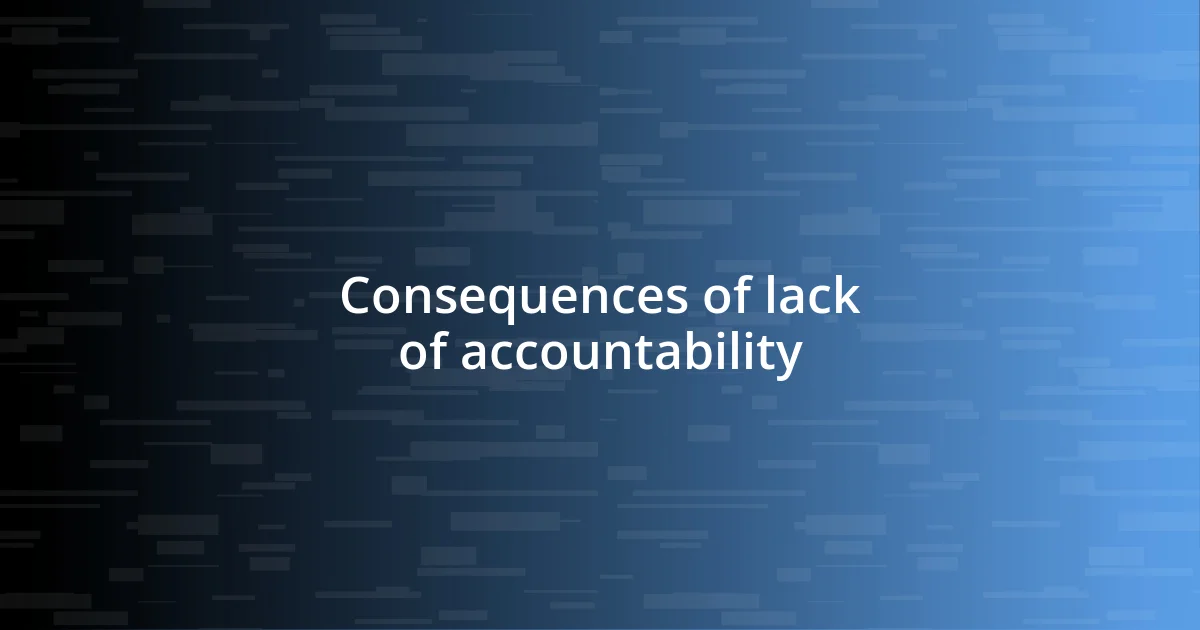
Consequences of lack of accountability
Without accountability, the consequences can be dire. I once reported on a local governmental decision without double-checking the figures involved. When inaccuracies emerged later, it not only discredited my work, but it also fueled mistrust toward the entire news organization I represented. It made me realize how one instance of negligence could ripple out and impact the audience’s perception of journalism as a whole.
Moreover, a lack of accountability can foster an environment where misinformation thrives. I remember attending a town meeting where residents passionately discussed claims that were later debunked but initially spread through a careless report. It struck me how unverified information can ignite fear and misunderstanding within a community. Have you ever witnessed how quickly rumors can spiral? It’s a powerful reminder that every piece we publish carries the weight of responsibility.
Finally, there’s the ethical dilemma that arises when journalists evade accountability. I had a colleague who once cut corners in their reporting. When the truth came to light, it wasn’t just their career that suffered; the credibility of the entire team was jeopardized. The trust we build with our audience is fragile, and losing it can take years to regain. I often ask myself: how can we expect our readers to invest in our stories if we don’t hold ourselves to the same standard?
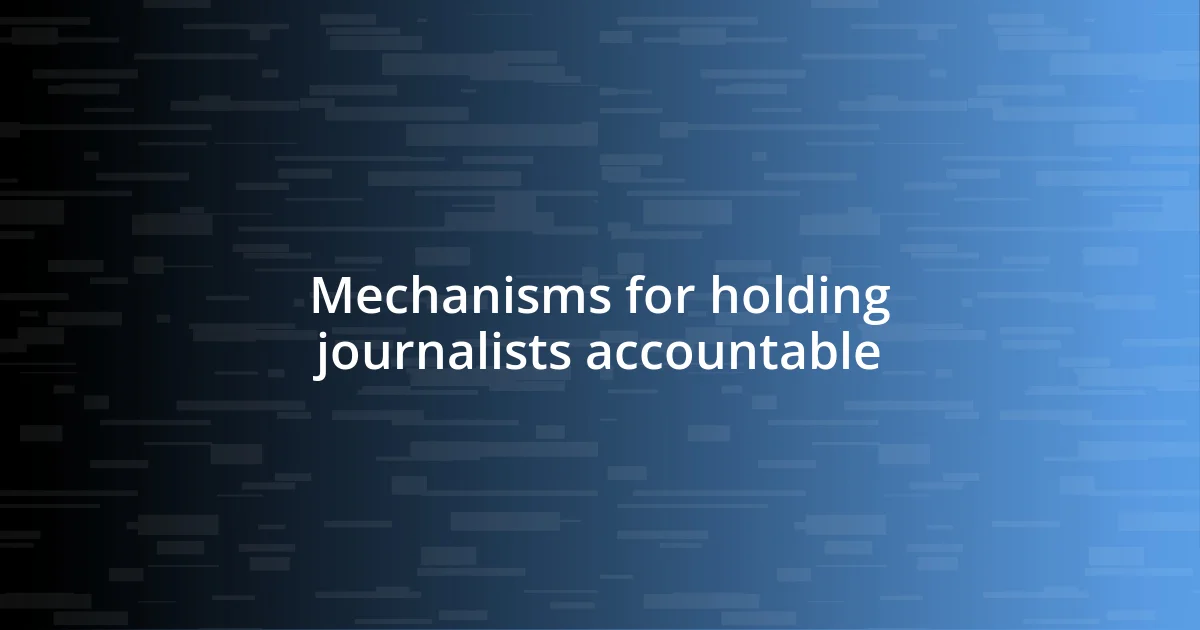
Mechanisms for holding journalists accountable
When it comes to holding journalists accountable, one effective mechanism is peer review within the newsroom. I remember being part of a collaborative reporting project, where we routinely critiqued each other’s work before publication. It isn’t just about spotting typos; it’s about challenging assumptions and offering alternative perspectives. Have you ever had someone provide insight that made you rethink your entire angle? That experience reinforced the importance of having accountability forged through teamwork, helping to create a culture where excellence is expected.
Another crucial mechanism is the establishment of editorial standards and guidelines. In my early days, I worked for a publication that had a well-defined code of conduct. Whenever concerns arose about a story, we would refer back to those guidelines. It was reassuring to know there was a compass guiding our ethical decisions. Do you think such frameworks can help mitigate the subjective nature of journalism? I can say without doubt they play a pivotal role in maintaining integrity, ensuring every reporter understands the ramifications of their words.
Public feedback is also a powerful tool in holding journalists accountable. There was an instance when readers voiced their dissatisfaction with a controversial piece I wrote. Hearing their perspectives was tough, but it ultimately led me to reconsider my approach to similar stories. It’s an eye-opener—how often do we think about the impact of our reporting on our audience? Engaging with the public not only fosters trust but also reminds us that we are part of a larger conversation.
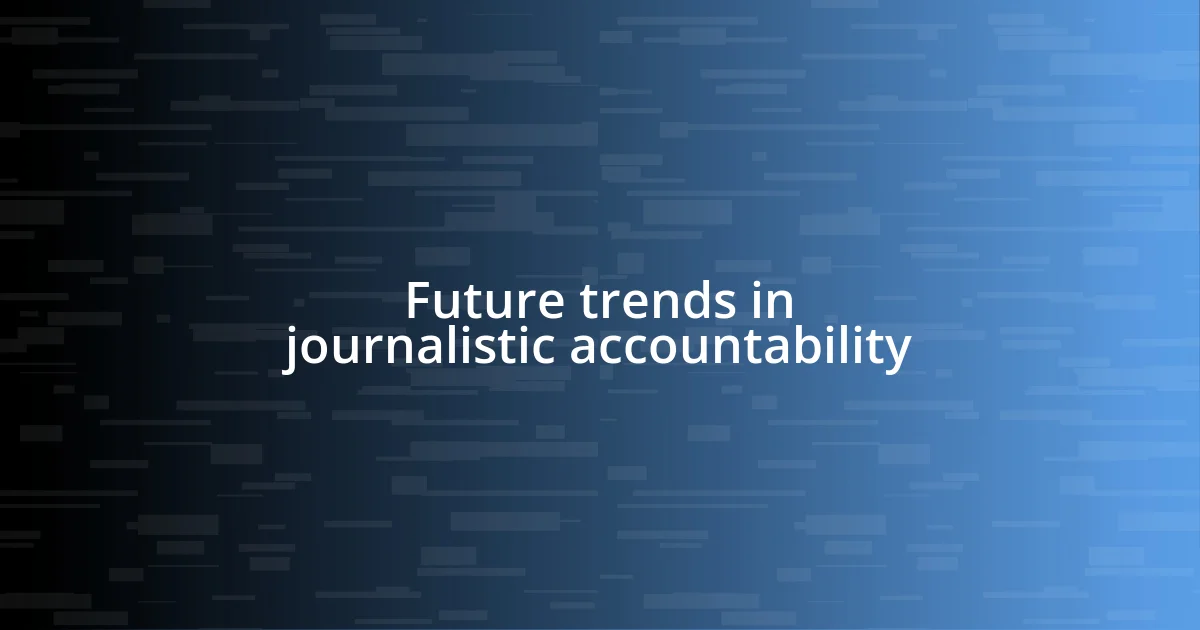
Future trends in journalistic accountability
As we look ahead, I foresee technology playing a transformative role in enhancing journalistic accountability. The rise of AI tools capable of fact-checking can revolutionize how we validate information before it reaches the public. For instance, during a recent project, I relied on an AI-driven platform to cross-check sources, significantly reducing the risk of errors. Can you imagine the potential if every newsroom embraced such technology? It could lead to a new standard in accuracy and trust.
I also believe that collaborations between news organizations and independent watchdogs will become increasingly common. I once attended a workshop featuring journalists and accountability advocates discussing best practices. Their insights were invaluable—just think about how effective it can be when multiple entities unite to uphold journalistic standards. Isn’t it comforting to know that there could be several eyes ensuring integrity in reporting? As we move forward, this symbiotic relationship may prove crucial in combatting misinformation.
Finally, I envision a shift toward greater transparency in the reporting process. Earlier in my career, I had the opportunity to publish a behind-the-scenes piece about how a significant investigation unfolded. The feedback was overwhelmingly positive. Readers appreciate seeing the mechanics of journalism, and sharing the journey can foster deeper trust. How might our work change if we were more open about our processes? I believe that vulnerability in sharing our challenges and successes could pave the way for stronger connections with our audience.






